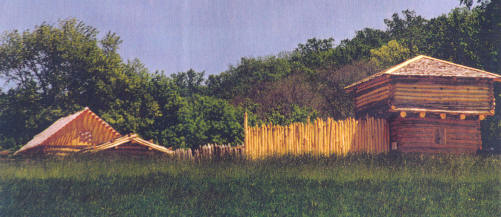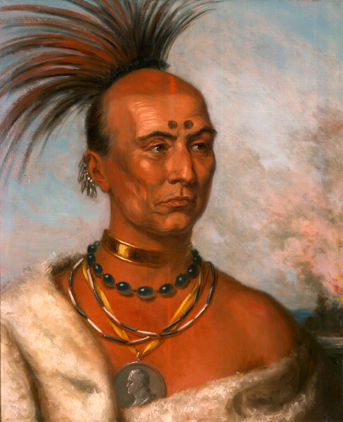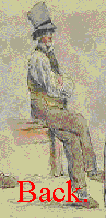"An Account of the Attack…
on Apple River Fort."
June 16, 1832.
A letter by John Flack, an eyewitness.
[Webmaster’s Note: While not an enrolled militiaman in Captain Clack Stone’s Company, John Flack nevertheless was present inside Apple River Fort when Black Hawk attacked on June 24, 1832. John A. Wakefield published Flack’s letter in his 1834 book History of the War between the United States and the Sac and Fox Indians... While containing some errors, and written in the prevailing style and anti-Indian sentiment of the period, Flack's recollection remains a rare and important account of the only attack made by Black Hawk on a fortified strongpoint during the 1832 Black Hawk War.]
Mr. John A. Wakefield:
SIR: -- In reply to your request, I proceed to give an account of the attack of the Indians on Apple River Fort. Apple River Fort is situated about fourteen miles east of Galena. It was on the 24th of June, when harmony and peace appeared to reign through the fort, the day before a waggon had been despatched to Galena for the purpose of bringing a supply of lead and meat, which had run short in the afternoon on Sunday, the waggon arrived with a supply of meat and lead. About the time the team was removed from the waggon, the ladies of the fort had assembled to go to the river to hunt goose-berries; after starting they discovered coming from towards Galena three men, and being anxious to hear the news from there, they concluded to wait, expecting to hear something about the Indians. When they arrived they proved to be men on an express from Galena going to Dixon's ferry on Rock river; one of the men was a Mr. F. Dixon, the other two I have no recollection of their names. They were all intoxicated , after coming up they recollected that their guns were empty; one of the men dismounted and charged his piece, the other two would not; the man, after loading his gun, mounted his horse and they all rode off in full speed, whooping and hallooing towards Dixon's ferry. When they had got to the distance of about three hundred yards, the one that carried the loaded gun was some fifty or sixty yards ahead of the other two, when a large number of Indians, being in ambush; arose and fired upon him; when he fell from his horse, shot through the thigh; his horse fled and left him; he arose and fired at the Indians at about the distance of fifteen steps, but his fire took no effect as was ever ascertained. The Indians made towards him with their hatchets, when the other two coming up to his relief with their empty guns, they presented their guns, which caused the Indians to halt till the wounded man had got between them and the fort, they kept giving back with their guns presented till the wounded man gained the fort. The firing of the guns gave the alarm just in time for the people to make their retreat to the fort.
 Apple River Fort had once been an extensive smelting establishment, and had become a considerable village, the fort being small, families lived in these houses in day time, and every one had his own to himself, but at night all repaired to the fort for safety.
Apple River Fort had once been an extensive smelting establishment, and had become a considerable village, the fort being small, families lived in these houses in day time, and every one had his own to himself, but at night all repaired to the fort for safety.
The Indians pursued these men within firing distance of the fort, all on horseback, they rode up, dismounted and hitched their horses, and I think in about three minutes the fort was surrounded by about one hundred and fifty Indians, with all the savage ferocity and awful appearance, that those monsters could possibly appear in. The inhabitants had all reached the fort in time to defend themselves, which appeared to have been a providential thing, for if it had not been for the firing of the Indians on the express bearers, the fort would have certainly been taken, as the people would have been taken upon a surprise when they were not apprehending the least kind of danger from those savage barbarians.
 There was a very heavy fire kept up for the space of one hour on both sides. Early in the engagement a Mr. George Herclurode [sic] was shot in the neck, and never spoke afterwards, he being at a port hole trying to defend himself and the helpless inmates of the fort; a Mr. James Nuting [sic] was also shot at the same time in the head, but not mortally. There appeared to be no dismay in the fort.
There was a very heavy fire kept up for the space of one hour on both sides. Early in the engagement a Mr. George Herclurode [sic] was shot in the neck, and never spoke afterwards, he being at a port hole trying to defend himself and the helpless inmates of the fort; a Mr. James Nuting [sic] was also shot at the same time in the head, but not mortally. There appeared to be no dismay in the fort.
Such bravery and heroism amongst women has scarcely ever been surpassed in any country. Women and children were all actively engaged in the defence of the fort. Girls eight years old were busily engaged in running balls and making cartridges, and women loading guns.
The Indians got into those houses before spoken of, and knocked out the chinking and kept up their fire until they got discouraged. They then commenced plundering the houses, chopt, split and tore up a quantity of fine furniture. There was scarcely a man or woman that was left with a second suit of clothing. They went into my father's house; there was a large bureau full of fine clothes, they took six fine cloth coats and a number of fine ruffle shirts, with their tomahawks they split the drawers and took the contents. They ripped open the bedticks, emptied the feathers, took all the bedclothing, and broke all the delf in the cupboards. Some of the out houses were kept for the purpose of storing away provisions; they got into those houses where a number of flour barrels were stowed away; they would lie down on their faces and roll a barrel after them until they would get into a ravine, where they were out of danger; they then would empty the barrels of flour, after they had destroyed this necessary article, and when they found they could not succeed in taking the fort as they expected, they then commenced the warfare upon the stock; they killed all the cattle that were near the fort and took a number of fine horses to the number of about twenty, which were never got again by the owners. The horse that lost his rider in the first onset ran to the fort, which the Indians did not get.
Mr. Dixon on his retreat never stopt at the fort, thinking from the large number of Indians the fort would be taken, he made for Galena, and not being acquainted with the country he missed his road, and went to the house of Mr. John McDonald, who had a very large farm, of which Apple river formed a part of the fence. When he got to the house he found a large number of Indians at that place, and in a few minutes found himself completely surrounded; he lit from his horse, let down a pair of draw-bars, and made his escape across the river to Galena. At the time the Indians commenced the fire upon the express bearers, the people of the fort started an express to Galena for assistance, which never came until about eleven o'clock the next day. Colonel Strode who had the command at Galena, marched to their assistance with about one hundred men. But this little band of men, women and children, had bravely stood their ground and kept the field, in spite of the Black Hawk and his ferocious savage brothers, with all their frightful yells and war-whoops.
But it was not without some suffering that this small handful did it. There was no water in the fort, and being taken upon a surprise, the people had not time to lay any in after the attack was first made upon the express bearers, and the weather being very warm, the men and women became so fatigued and exhausted in time of the engagement that they were compelled to drink dish water, to quench their thirst.
 This fort was commanded by Captain Stone, and there were twenty-five men besides women and children. This small force stood their ground before the great and mighty chief called Black Hawk, and upwards of one hundred and fifty of those hideous monsters, that take so much delight in their savage warfare; as it was afterwards ascertained that Black Hawk commanded in person at this engagement.
This fort was commanded by Captain Stone, and there were twenty-five men besides women and children. This small force stood their ground before the great and mighty chief called Black Hawk, and upwards of one hundred and fifty of those hideous monsters, that take so much delight in their savage warfare; as it was afterwards ascertained that Black Hawk commanded in person at this engagement.
It was supposed that the Indians lost several of their number in this skirmish, as they were seen putting several Indians on their horses and packing them off during the engagement, and after it was over there was a quantity of blood discovered on the ground.
The Indians in killing the cattle would skin and take out of a beef such pieces as they seemed to like best, leaving the balance on the ground.
Apple River Fort is about sixteen miles from Kellogg's Grove and it is believed by all that this was the war party of Indians that attacked Major Dement's spy batallion [sic] on the next day at this grove.
Source: John Allen Wakefield, Frank E. Stevens, editor, History of the War between the United States and the Sac and Fox Nations of Indians, and Parts of Other Disaffected Tribes of Indians, in the Years Eighteen Hundred and Twenty-Seven, Thirty-One, and Thirty-Two; Reprint Publication: Wakefield's History of the Black Hawk War (Original Publication: Jacksonville, Ill.: Calvin Goudy, 1834. Reprint Publication: Chicago: The Caxton Club, 1908.) pp.66-69.
 Apple River Fort State Historic Site.
Apple River Fort State Historic Site.
 Galena/Jo Daviess County History Museum.
Galena/Jo Daviess County History Museum.
 Illinois Black Hawk War Veterans Database.
Illinois Black Hawk War Veterans Database.

 Apple River Fort had once been an extensive smelting establishment, and had become a considerable village, the fort being small, families lived in these houses in day time, and every one had his own to himself, but at night all repaired to the fort for safety.
Apple River Fort had once been an extensive smelting establishment, and had become a considerable village, the fort being small, families lived in these houses in day time, and every one had his own to himself, but at night all repaired to the fort for safety.
 There was a very heavy fire kept up for the space of one hour on both sides. Early in the engagement a Mr. George Herclurode [sic] was shot in the neck, and never spoke afterwards, he being at a port hole trying to defend himself and the helpless inmates of the fort; a Mr. James Nuting [sic] was also shot at the same time in the head, but not mortally. There appeared to be no dismay in the fort.
There was a very heavy fire kept up for the space of one hour on both sides. Early in the engagement a Mr. George Herclurode [sic] was shot in the neck, and never spoke afterwards, he being at a port hole trying to defend himself and the helpless inmates of the fort; a Mr. James Nuting [sic] was also shot at the same time in the head, but not mortally. There appeared to be no dismay in the fort.
 This fort was commanded by Captain Stone, and there were twenty-five men besides women and children. This small force stood their ground before the great and mighty chief called Black Hawk, and upwards of one hundred and fifty of those hideous monsters, that take so much delight in their savage warfare; as it was afterwards ascertained that Black Hawk commanded in person at this engagement.
This fort was commanded by Captain Stone, and there were twenty-five men besides women and children. This small force stood their ground before the great and mighty chief called Black Hawk, and upwards of one hundred and fifty of those hideous monsters, that take so much delight in their savage warfare; as it was afterwards ascertained that Black Hawk commanded in person at this engagement.

